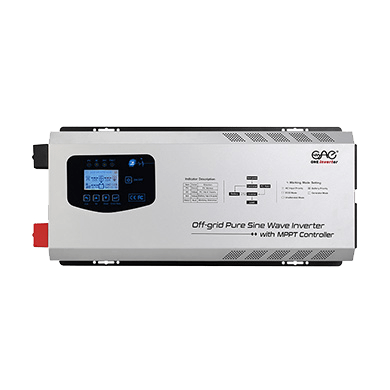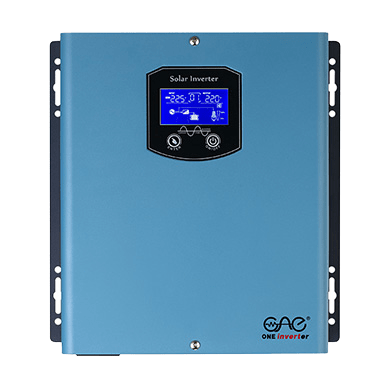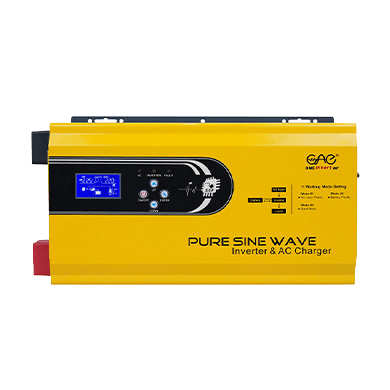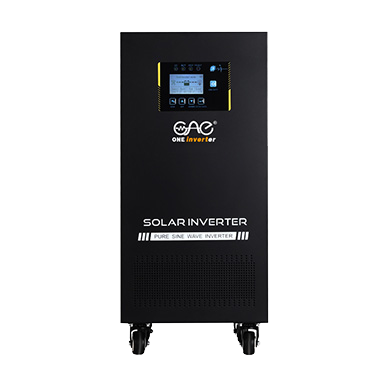Off-grid solar solutions are an innovative way of energy. Because they can offer an independent and reliable power supply, off-grid solar solutions are becoming more and more popular in remote locations or in situations where power grids are unstable. In addition to supplying steady, clean power, they will lower carbon emissions and promote environmental protection.
The key component of an off-grid solar energy system is the off-grid solar inverter. The off-grid inverter’s primary job is to change the direct current (DC) that the solar panels produce into alternating current (AC), which is used by homes and devices.
The functions, benefits, and applications of off-grid solar inverters are covered in detail in this article to aid in your understanding of this essential component. Gaining knowledge about off-grid solar inverters will help you understand their role in off-grid solar systems and the advantages they can offer.
Off-grid solar inverters are key components in off-grid solar systems. Below, we outline what exactly off-grid solar inverters are, how they compare to grid-connected inverters, as well as their key components and the types of off-grid solar inverters available.
The off-grid solar inverter is the central part of the solar system, designed to convert DC power generated by solar panels into AC, which can be used by home appliances and devices.
It is the most crucial link to ensure the independence and reliability of power supply in off-grid systems, especially in remote areas where the grid is not accessible or in scenarios facing frequent power outages. Additionally, it manages the charging and discharging process of the energy storage battery to ensure continuity in the operation of the system and power supply.
The main differences between an off-grid solar inverter and a grid-connected one are the working environment and the functions each performs. The grid-connected inverter needs to be connected with the public grid, wherein it feeds extra power back into the grid. It cannot work independently when the grid is down.
However, the off-grid solar inverter does not rely on the operation principle of the grid, it requires batteries to store electricity. When the public grid does not exist, it is still able to provide users with stable electricity. In addition, off-grid inverters often have more sophisticated charge control functions that effectively manage battery life and energy storage efficiency.

The off-grid solar inverter mainly consists of three parts: the charge controller, battery, and inverter circuit.
The charge controller is an important part of the off-grid system, and it ensures an effective amount of electricity flows from the solar panel to the battery. The charge controller works to prevent overcharging and over-discharging the battery, which prolongs the life span of the battery by maintaining stable operations of the system. It is usually integrated with the inverter and is therefore responsible for maximizing the efficiency of solar power generation and storage.
The battery is the hub of energy storage in the off-grid system, which can feed the power to the inverter when sunlight is unavailable or at night. In the process of charging and discharging the battery, the inverter realizes the function of storing electric energy and releasing it. The selection of the appropriate capacity and type of batteries in off-grid systems is very important, the main types of batteries used include lead-acid and lithium-ion batteries.
The inverter circuit is responsible for the process of converting direct current into alternating current and for power quality control of electrical energy. An efficient inverter circuit not only gives stable output power but also minimizes loss of energy and improves the overall system efficiency.
The off-grid solar inverter has a variety of output current waveforms and diverse functional characteristics to meet the needs of different use scenarios and different users. There are three common types: pure sine wave inverter, modified sine wave inverter, and multi-mode inverter.
Pure sine wave inverters are considered by most people to be the best among off-grid solar system inverters. Their primary benefit is that the waveform of the alternating current output is just about identical to the power supplied from the public grid, offering a standard sinusoidal waveform.
The output of this electrical waveform is very stable, and the voltage and current fluctuate very little, hence it can provide reliable power support for all kinds of household appliances and industrial equipment.
Pure sine wave inverters are specially designed for users who have strict requirements on the quality of power equipment. These inverters ensure safe and efficient operation because they will avoid equipment damage or unstable work due to current fluctuations.
Although pure sine wave inverters usually cost significantly more than any other kind of inverter, they are faultless regarding performance and reliability for the user’s long-term experience and are a worthwhile investment.
Compared to pure sine wave inverters, modified sine wave inverters (also known as improved wave inverters) are more economical. The waveform of its output is approximately a sine wave but distorts the waveform to a certain extent. Therefore, compared to the pure sine wave inverter, it has relatively poor current smoothness.
Modified sine wave inverters can be applied to many common appliances and equipment, however, for some high-power or precision equipment, they can cause electromagnetic interference, which can affect the performance of these devices.
Improved sine wave inverters are relatively affordable, thus, they would be more suitable for users who have a small budget, or where high-class power quality is not required, such as small home systems or temporary power supply solutions.
A multi-mode inverter can work flexibly and switch between off-grid and grid-connected modes. While operating independently without support from the grid is possible, it can also connect to the grid or backup power as needed.
Multi-mode inverters usually have functions of battery management and grid connection, with the intention of intelligently switching power sources based on energy demand. They can both generate electricity from the sun and draw power from the grid when power is low.
This type of inverter would better serve users looking to ensure greater flexibility between independence of energy and the grid, particularly for users residing in areas where the grid conditions are unstable and will always require backup power. For multiple scenarios of applications, multi-mode inverter offers greater choice and power autonomy for users.

Off-grid solar inverters are not only the core device in converting solar energy into electrical energy but also have manifold functions to ensure operating stability in off-grid systems and power supply security.
A solar panel is a device that converts light energy into direct current. However, the type of electricity produced by solar panels is not generally used in practical situations since most household appliances and industrial machinery require AC power for normal running.
The main function of the solar inverter in the off-grid solar system is to convert the DC produced by a solar panel into AC conforming to the standard. Therefore, inverters play a vital role in off-grid solar systems, ensuring that users can make efficient use of solar energy resources.
Through the inverter conversion process, DC is transformed into AC that can then be supplied safely and stably to home and industrial devices. This not only increases the efficiency of the use of solar energy but also makes it easier for users to utilize electricity.
Off-grid solar inverters are not just simple devices of power conversion, they can also be intelligent power supply and demand management. They can monitor the total load of electrical equipment in real-time, so the system will not overshoot the batteries and solar panel power generation capacity.
When the demand for electrical equipment and power supply does not match, the off-grid solar inverter will automatically adapt to optimization and rationally distribute available power resources, effectively avoiding overload or systems shut down.
This intelligent management surely provides a guarantee that the system operates stably and prolongs the service life of batteries to ensure the safe and reliable utilization of users.
Some off-grid inverters come with an automated switching function. If the solar or battery power is low, the system will switch over to the backup power supply, like diesel generators or some other forms of energy systems. In this way, even when the sun is blocked by clouds or at night, users can continue to receive electricity without being interrupted by lack of energy supply.
Batteries save the energy produced during the daytime in off-grid solar systems for use at night or whenever there is no light. Off-grid solar inverters not only convert solar energy into household electricity but also manage how the battery charges, with proper charging happening during the day and power release at night.
The inverter also checks the health of the battery to avoid overcharging or over-discharging, thus greatly extending its life. It controls the charging and discharging of the battery in an intelligent way, allowing the system to protect the battery to the greatest extent while meeting the power requirements of the entire system, thereby improving its reliability and durability.
By effectively managing battery charging, discharge, and health monitoring, off-grid inverters significantly improve the overall reliability and durability of the solar system. The inverter can intelligently adjust the power supply according to fluctuating power demand and battery status, hence providing users with unbroken, steady power in various usage scenarios.
Overload Protection: When the electrical load exceeds the processing capacity of the solar inverter, the overload protection automatically shuts off the power supply to avoid damage to the equipment or failure of the inverter. This can prevent the system from getting dangerous under a high load condition that is not expected.
Short Circuit Protection: Short circuit is one of the general faults in power systems. The short circuit protection function can cut off the power supply immediately once the circuit short circuits, preventing damage to the inverter and other equipment for the security of the whole system.
Ground Fault Protection: Due to the hazardous incidence of electric shock because of poor grounding, most models of inverters will have protection against ground faults. In case of a ground fault, this feature will detect it and act on it fast to ensure safety for users and equipment, ensuring that systems operate safely in harsh environments or unstable geographical conditions.

Off-grid solar inverters have plenty of advantages, and below we explore their major advantages in three aspects: energy independence, environmental benefits, and versatility and adaptability.
Off-grid solar inverters allow users to independently produce and use electricity away from the public grid, thus significantly reducing dependence on the public grid. This is crucial for remote areas, whose remote location complicates their connection to the grid, causing numerous electricity challenges to the residents.
Through the use of off-grid solar energy systems, users can obtain a stable power supply, whether for daily electricity or even for electricity needs in emergency situations, off-grid solar inverters can provide effective protection. Since this is a self-sufficient model, users can break away from the constraints of traditional power grids and gain greater flexibility and autonomy.
The use of off-grid solar inverters can not only reduce dependence on the grid but can also help save for the long term. Though high in initial investment, with increasingly advanced solar panels and inverter technology, year by year, the equipment price goes down, and many users finally realize that it is a considerable return on investment.
Through solar power, especially when the price of electricity is on the rise, users can save long-term in terms of paying bills for electricity. In addition, the maintenance cost of off-grid solar inverters is relatively low, and usually only needs to be checked and cleaned regularly, which further enhances the economic benefits.
Utilizing off-grid solar inverters means a lot in environmental protection. As a clean and renewable source of energy, solar can drastically reduce the carbon footprint. Faced with increasingly severe problems in global climate change in modern times, the utilization of off-grid solar energy systems not only reduces dependence on fossil fuels but also cuts down greenhouse gas emissions.
Growth in off-grid solar inverters has been supporting sustainable energy practices. For instance, large-scale adoption of solar energy as the main source of energy can reduce the level of demand for traditional energy and promote the need for green energy.
With the increasing awareness of environmental protection, renewable energy is gaining more and more attention. The rollout of off-grid solar systems allows users to contribute towards a better future and provides them with a practical solution for their needs, enabling them to live a modern life.
Off-grid solar inverters are highly versatile and can provide power supply even in remote areas. In remote and rural locations, the development of grid infrastructures is very slow, hence leading to shortages for users. Off-grid solar systems are not dependent on grid conditions, thus guaranteeing a source of electricity supply to users. This flexibility has made solar the preferred energy solution in many regions.
Off-grid solar inverters also play an important role in disaster preparedness and energy security. In areas prone to disasters, power grids tend to get damaged during disasters, which leads to massive cuts in power supply. At this point, off-grid solar systems provide a reliable backup power solution that allows users to still get power support in case of an emergency.

Off-grid solar inverters are applied in various fields, which include residential, commercial, community, and entertainment. This range of applications increases flexibility, making it an integral part of modern energy solutions that can meet users’ power needs under a variety of conditions and demands.
Off-grid solar inverters provide an assured and steady supply of energy to individual residences, especially in remote areas where grid coverage is inadequate and electricity supply is often unstable or difficult to obtain.
In this case, rural households can make full use of the rich resources of solar energy by installing an off-grid solar energy system to meet the electrical demand of people in their daily lives with ease. This independent power system not only solves the long-standing power shortage problem for rural residents, but also reduces dependence on fossil fuels and promotes the development of green energy.
In addition, off-grid solar inverters could also be applied for emergency power backup support and provide critical power support in the case of a power outage or emergency. This is particularly important for those areas where the grid is unstable or at constant risk of power outages, for which off-grid inverter systems can effectively help to raise the security and reliability of power supply.
In the commercial sector, off-grid solar inverters ensure businesses are independently supported with power, especially for those site locations not on the grid, such as mines, construction sites, and remote commercial facilities.
Many of these sites face a number of problems due to unstable power supply, but access to an electricity supply by using an off-grid solar system allows companies to generate power independently to meet daily business and operation needs.
This will not only reduce operation costs for enterprises but also help the enterprise avoid dependence on external power supply, in cases of fluctuation of prices or energy shortage, enterprises can still get a stable power supply.
Power independence makes companies more flexible and efficient in their production activities, especially when operating in far-flung areas where energy access is difficult, making off-grid solar systems ideal for multiplying productivity.
Companies can also enjoy additional brand advantages by using off-grid solar systems. As there is rising awareness of environmental protection and sustainability all over the world, more and more consumers and partners favor eco-friendly businesses. Businesses that use solar energy as a source of energy can reduce carbon emissions and cut down on the use of fossil fuels, which will also enhance the green image of the business.
At the community level, off-grid solar inverters play a key role in the construction of microgrids in developing regions. A microgrid is a small power network that can run independently within a local area, offering a stable power supply to community residents.
Off-grid solar inverters can maximize the potential of utilization in communities with solar energy resources. The level of self-generated and self-managed electricity meets the daily needs of the residents, increasing security for energy in the community while reducing reliance on power from the grid.
Besides, off-grid solar energy systems also demonstrate important value in post-disaster rescue and recovery processes. Since most natural disasters have seriously destroyed the power infrastructures, they usually lead to wide-scale power cuts, hence, on-site temporary power supplies become very crucial at this time.
Off-grid solar systems can be quickly deployed to provide emergency power support to disaster areas and help residents restore basic living facilities.
The application potential of off-grid solar inverters is also great in the entertainment field, especially for outdoor activities and leisure travel. More and more campers and RV enthusiasts, as well as others, go for solar systems as their first choice for electricity supply to enable them to sustain their comfortable lives in a natural environment far from the city grid.
These systems can supply a reliable source of power for lighting, refrigeration equipment, charging equipment, among others, for continued usage by people when they are outdoors. By utilizing solar energy, outdoor enthusiasts no longer have to rely on traditional power generation equipment such as gasoline generators, which contribute to noise and pollution, creating a quieter and greener campsite environment.

Off-grid solar inverter, as the core component of the solar system, can not only convert DC into AC for the home, but also help manage the charge and discharge of the battery and adjust the power supply, which is very functional. It is also increasingly widely used in various fields, such as residential, commercial, community, and entertainment.
In addition, off-grid solar energy systems have many advantages, such as reducing operating costs, reducing carbon emissions, and improving energy independence, which is helpful for sustainable development and environmental protection. With the growing global demand for clean energy, the importance of off-grid solar inverters in the energy field is needless to say, absolutely more and more obvious.
Among various off-grid solar Inverters, One Inverter stands out for its superior performance and reliable quality. Choose One Inverter, you’ll experience unmatched energy efficiency, long-lasting durability, and a reliable off-grid power solution for all your needs.